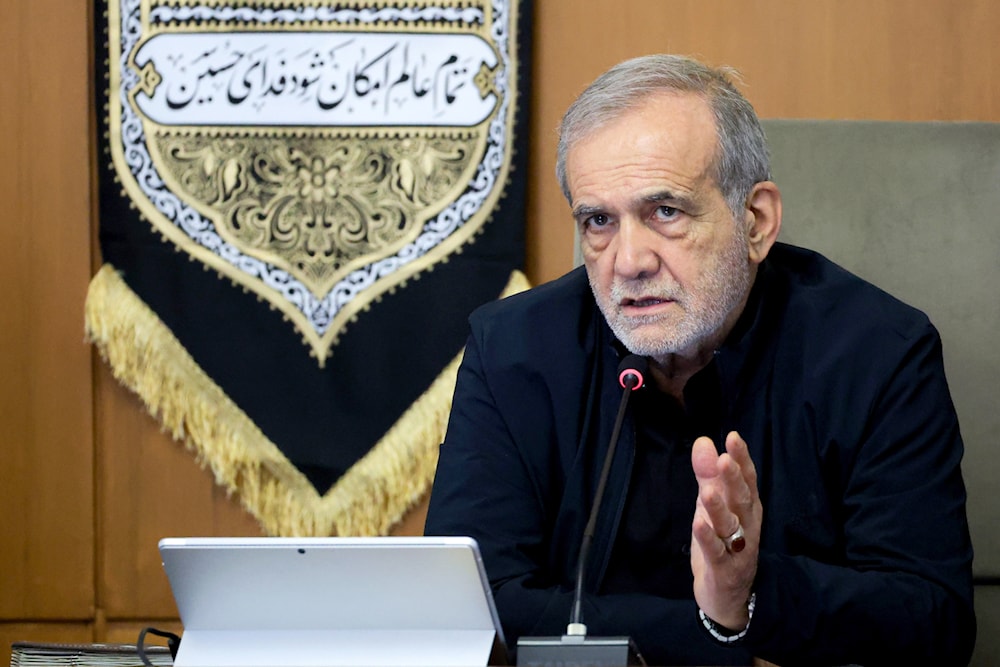Pezeshkian affirms regional unity following Israeli aggression
Iranian President Pezeshkian hailed the resilience of the Iranian people, who withstood the bombardments with remarkable strength.
-

Iranian President Pezeshkian chairs cabinet meeting on July 20, 2025 (President.ir)
Iranian President Masoud Pezeshkian has reaffirmed Tehran's unwavering commitment to regional solidarity and multilateral diplomacy in the aftermath of a 12-day war launched by the Israeli regime. Speaking to senior diplomats and deputy foreign ministers at the Foreign Ministry on Saturday, the president stressed Iran's strategic pivot toward its neighbors and international allies, while condemning the aggression inflicted upon the Iranian people.
"Through established coordination and policies, we will seek to prioritize expansion of closer, deeper, and better relations with our neighbors, and then develop and advance our ties with the countries with which we have good interactions, including Russia, China, the BRICS group, the Shanghai Cooperation Organization (SCO) and the Eurasian Union," Pezeshkian stated. His remarks signaled a foreign policy built on regional integration, South-South cooperation, and resistance to Western-imposed isolation.
"We will also continue the process of cooperation with European countries and other countries based on wisdom, dignity, and expediency," he added, asserting that Iran's diplomatic path would be neither confrontational nor submissive, but grounded in self-respect and strategic patience.
Unyielding Resolve
The remarks come after "Israel's" unlawful military campaign against Iran between June 13 and June 25, a war waged with overt American backing. The regime's strikes on Iran's sovereign territory triggered fierce condemnation from civil society and international organizations, with the notable exception of the UN Security Council and certain Western governments.
Pezeshkian hailed the resilience of the Iranian people, who withstood the bombardments with remarkable strength. "The occupying regime aggressively sought during the recent 12-day war to bring the country to its knees, but the dear Iranian nation took outstanding measures that need to be appreciated earnestly," he said.
He also drew attention to Iran's active diplomacy and media engagement throughout the conflict. "Even though some departments were shuttered down for a while, our loved ones were present in relevant bodies and established international ties," he noted, commending those who worked tirelessly behind the scenes.
Diplomatic Resistance
Pezeshkian credited Iran's diplomatic corps with exposing "Israel's" aggression before the global public. "The result of such efforts was that almost all international agencies, except for the Security Council and the United Nations, condemned the aggression," he said, revealing the widening gap between public opinion and institutional complicity.
He also denounced the nature of the Israeli assault: "The Israeli regime initiated a war that was fundamentally unlawful under all international principles and regulations. Unfortunately, in today's world, such aggressive actions are often justified by major powers."
Citing the guidance of Sayyed Ali Khamenei, Pezeshkian stressed the importance of balancing military preparedness with diplomatic outreach. The Leader, he noted, called for the full readiness of Iran's defense forces while affirming that diplomacy must remain a cornerstone of national strategy.
Read more: 'Israel' lost deterrence; Iran rose as regional deterrent power: Raad
As the Israeli regime reels from the economic backlash of its failed gamble, with its economy facing billions in losses, widespread business disruption, and global censure, Iran's measured response has underscored its position as a pillar of resistance and regional leadership.
In closing, President Pezeshkian expressed gratitude for the Foreign Ministry's efforts, reiterating Iran's resolve to pursue a just and sovereign foreign policy, grounded in mutual respect, strategic alliance-building, and defense of national dignity.

 4 Min Read
4 Min Read










